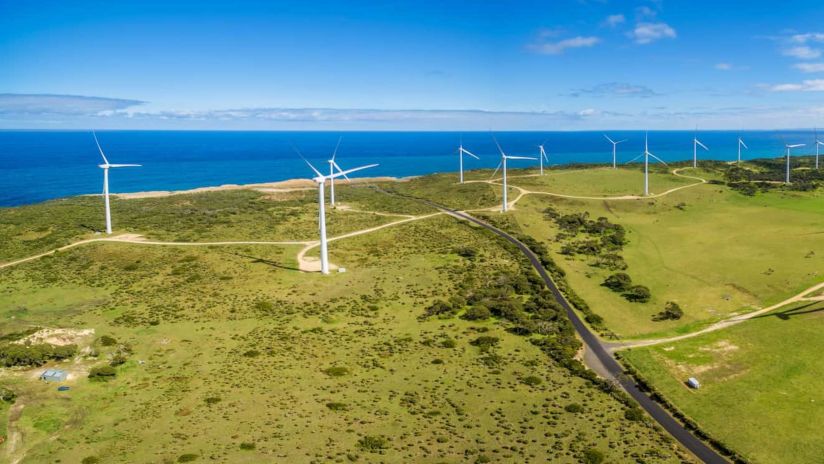Carbon neutral from this year, enabling 100% renewable energy by 2025, and reducing absolute emissions 50% by 2030 – we’re acting on climate change
Telstra is one of the largest consumers of power in the country. Powering networks to cover a continent this big so that millions of Australians stay connected requires something in the order of 5.9 petajoules of energy each year and last year that resulted in nearly 1.3m tonnes of greenhouse gas emissions.

This information was correct at the time of writing. For an updated view of our Sustainability targets and climate action go to Doing better for the future: Telstra's Sustainability Hub.
As businesses, governments, communities and all of us as individuals increasingly adapt and adopt new digital technologies, the volume of data on our network grew by 26 per cent last year alone and is expected to triple by 2025.
The good news is many of the digital initiatives that sit behind this massive increase in the consumption of data are having their own positive impact on the environment. Sensors deployed in their millions are creating previously undreamt-of efficiencies through smart cities with connected wheelie bins and traffic lights, smart manufacturing with connected robots and tooling and even smart agriculture with connected farm gates and farm animals.
These all have the potential to achieve major environmentally positive efficiencies but, at the same time, they also drive more data requirements over the internet thereby increasing the energy needed to power telecommunication networks.
We have been working hard to ensure that this does not lead to an increase in our greenhouse gas emissions and we are on track to meet our target to reduce our greenhouse gas emissions intensity in the three years to June 2020 by 50 per cent.
However, I believe we need to do even more.
The defining challenge of the 2020s
In a recent speech on responsible business I said climate change would be the defining challenge of the 2020s. I stand by that comment, conscious there will be other issues to challenge us. Events including Australia’s Black Summer of bushfires have raised urgent questions in the community about what climate change means and, more importantly, what must be done. The science is clear. Climate change, driven by greenhouse gas emissions, is creating risks that impact our economy, our environment, our communities and each of us individually.
I also said that it can be popular to comment on what others should be doing, particularly government. However, what I am more interested in is what we are doing at Telstra and what I am doing to make a difference as an individual. There is a collective and increasing sense of responsibility and urgency to act. Everyone has a role to play. The biggest risk to climate change is believing it’s someone else’s problem to fix.
Against this background, we are today announcing a significant acceleration in our response to reducing our impact on climate change.
Simply put, we have three key goals.
Our three key goals
- To be carbon neutral in our operations from this year, 2020
This means that we have to build on the great work we have already been doing to improve the efficiency of our energy consumption in our networks through the implementation of more efficient infrastructure and counteract the balance of emissions from our business via investment in carbon offsets. Offsets will be sourced largely from renewable energy projects both in Australia and the countries where we operate. This also builds on the certification last year of our sub-brand Belong as Australia’s first carbon neutral telco. - To be renewable leaders by enabling renewable energy generation equivalent to 100 per cent of our consumption by 2025
In an inter-connected energy grid, new renewable generation has the effect of decarbonising the grid for everyone. To support this, by 2025 Telstra will own or contract renewable energy generation in Australia and our other business locations for output equivalent to 100 per cent of the energy we consume in all of our operations, including our networks, buildings and data centres by 2025. This will have the effect of helping to decarbonise the Australian electricity grid for Telstra and everyone else. It builds on our work to date in underwriting Australian renewable energy generation via Power Purchase Agreements including solar and wind projects. We will continue to invest in Australia and also tap into offshore certificate markets. - Reduce our absolute emissions by at least 50 per cent by 2030
An ambitious target based on our commitment to the Paris Agreement that we announced last year and consistent with the associated ICT sector ambition. We will achieve this reduction through a range of initiatives including increasing investment in our energy efficiency program, advancements in new technology, building climate change considerations into long term business planning as well as the progressive decarbonisation of the electricity grid as the uptake of renewables grows.
We recognise that we do not have all of the answers on how we will achieve this but our intent is clear, our ambition is set and we are committed to achieving it.
To deliver against these ambitious and important goals, there are five key areas we are focusing on.
Five focus areas
- We will lead by example. We will hold ourselves to account in terms of our own targets and the support we offer other businesses on their climate emission management journeys. We also want to contribute to the broader discussion on climate, adding our technical expertise and advocacy to a discussion that is factual, science-based and focussed on supporting outcomes that accelerate carbon emission reduction.
- We will actively reduce our emissions on an absolute basis. We have reviewed the sources of our emissions and have scoped a major program of work to reduce our energy consumption over the next decade. This includes upgrading inefficient equipment and accelerating decommissioning of equipment that is no longer needed.
- We will drive change from the inside out including assisting our employees to understand and manage their own carbon footprint as well as encouraging and supporting our suppliers on their own de-carbonisation journeys and will reach out to our top 100 suppliers to identify opportunities to drive emissions reduction.
- In order to maximise the positive role we can play in decarbonising the Australian economy, we will enable our customers and the community by providing lower greenhouse gas emissions products and services as well as investing in energy and emissions management initiatives. This builds on our work to date in enabling other major corporates to access renewable Power Purchase Agreements.
- Climate change will continue to impact on our business and the resilience of our networks and services will remain a top priority. Our customers rely on us to keep them connected with the best technology and the best experience on the best network and we will continue to focus on that responsibility while addressing climate concerns. That is our purpose – to build a connected future so everyone can thrive.
A solid base
Our goals around climate change are ambitious but we are not starting from scratch. Telstra has already contracted significant renewable generation and, in doing so, has supported the construction of major renewable energy projects. Our sub-brand Belong also became Australia’s first carbon neutral telco last year.
Only last month we were named as one of only six Australian companies and among 179 globally to be A-listed on the Carbon Disclosure Project Global Climate Change Index. This recognition came from our work to reduce our greenhouse gas emissions intensity, which fell 24 per cent in FY18 with absolute emissions reducing 4 per cent. It also recognised our investments in a 226 MW wind farm through a consortium power purchase agreement and the many energy efficiency projects we have delivered.
Our core services have already had a decarbonising impact on the Australian economy for decades, with connectivity creating the ability to work remotely and in transit, driving business efficiencies and reducing physical transport needs across the broader economy.
We are proud of these actions but they are nowhere near enough in the context of the climate challenge we are facing. Changing the current trajectory on climate change – and meeting the defining challenge of the 2020s – will require bold and creative action along with decisive leadership and determination.
The time for that action is now.
Appendix: our existing climate position
- For the last 4 years we’ve been recognised through the Carbon Disclosure Project (CDP) for our climate change leadership and in 2020, Telstra was again awarded an A rating for our 2019 response. Only 6 Australian companies and 179 companies internationally scored A that year.
- Telstra has contracted significant renewable generation and has registered as a market generator in the National Electricity Market for the purpose of supplying that renewable generation to the grid. Telstra is Australia’s biggest corporate grid-connected renewable Power Purchase Agreement writer. In this role, Telstra has underwritten projects (including investments at Murra Warra wind farm and Emerald Solar Park) that generate renewable energy equivalent to the energy consumption of 100,000 households.
- Telstra has acted as the Market Generator to enable other corporates to participate in Power Purchase Agreements at scale. Our PPA activities have enabled renewable energy equivalent to the energy consumption of more than 100,000 households to be underwritten.
- As a provider of high reliability essential services via mission critical infrastructure (including in remote areas), Telstra invests heavily in energy storage and other mechanisms to support grid stability. These investments increase the amount of renewable energy that can be generated in Australia, thus helping Telstra and other Australian companies to reach their own renewable targets.
- At sites where Telstra has solar panels, they are combined with battery storage, and in total Telstra has the largest battery fleet in Australia. Telstra has been investing in climate friendly forms of storage and energy capacity (including hydrogen and lithium ion) for decades.
- In 2019, Belong (a Telstra sub-brand) became the first Australian carbon neutral telecommunications provider under the Australian Government’s Climate Active programme.
- In February 2020 the GSMA announced a landmark Science Based Target for the telecoms sector to reduce greenhouse gas emissions. Telstra was one of 29 major global telcos to commit to the Science Based Targets initiative and set reduction targets aligned to the Paris Agreement. The GSMA (which represents the interests of mobile operators worldwide) is committed to helping the mobile industry achieve net zero carbon emission by 2050.


